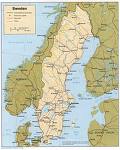Sweden sees Poznan climate parley as important "halfway stage"
 Stockholm - An upcoming United Nations Climate Change Conference in Poland was an important "halfway stage" to review efforts to forge a new climate deal to succeed the Kyoto Protocol that expires in 2012, Swedish Environment Minister Andreas Carlgren said Wednesday.
Stockholm - An upcoming United Nations Climate Change Conference in Poland was an important "halfway stage" to review efforts to forge a new climate deal to succeed the Kyoto Protocol that expires in 2012, Swedish Environment Minister Andreas Carlgren said Wednesday.
Among outcomes of the 12-day conference that opens Monday in Poznan, Sweden hoped to see "clear political guidelines" and "high political ambitions" for the UN Climate Summit to be hosted by neighbouring Denmark in December 2009, he said.
"Poznan will not be the venue to discuss emission cuts," Carlgren said, citing that the United States was in transition after the recent presidential elections.
Carlgren said the Poznan parley would, however, offer a chance to have "informal contacts" with representatives of US President-elect Barack Obama, who were to be part of the US delegation.
Both Carlgren and Swedish chief negotiator Anders Turesson said the election of Obama had contributed to a changed atmosphere among negotiators.
Carlgren expressed concern over deforestation, saying that it "contributed to 20 per cent of emissions" of climate changing gases, and said the issue needed to be addressed.
The Swedish minister said he "regretted" that the clean development mechanism (CDM), a key plank in the Kyoto Protocol, was concentrated to a few emerging economies like Brazil, China and India.
The CDM aims at reducing emissions by rewarding developing countries that invest in clean technologies.
While Sweden was, comparatively a major funder of the transfer of technology, Carlgren said it was necessary to push for market-driven solutions.
"It is untenable that industrialized countries make pledges that are then broken," Carlgren said, noting that only a handful of countries had achieved the UN goal of spending 0.7 per cent of their annual income on aid.
Carlgren said his meetings with representatives from China indicated a growing awareness and "self-interest" to reduce emissions but Beijing was still waiting for the new US administration to show its hand.(dpa)